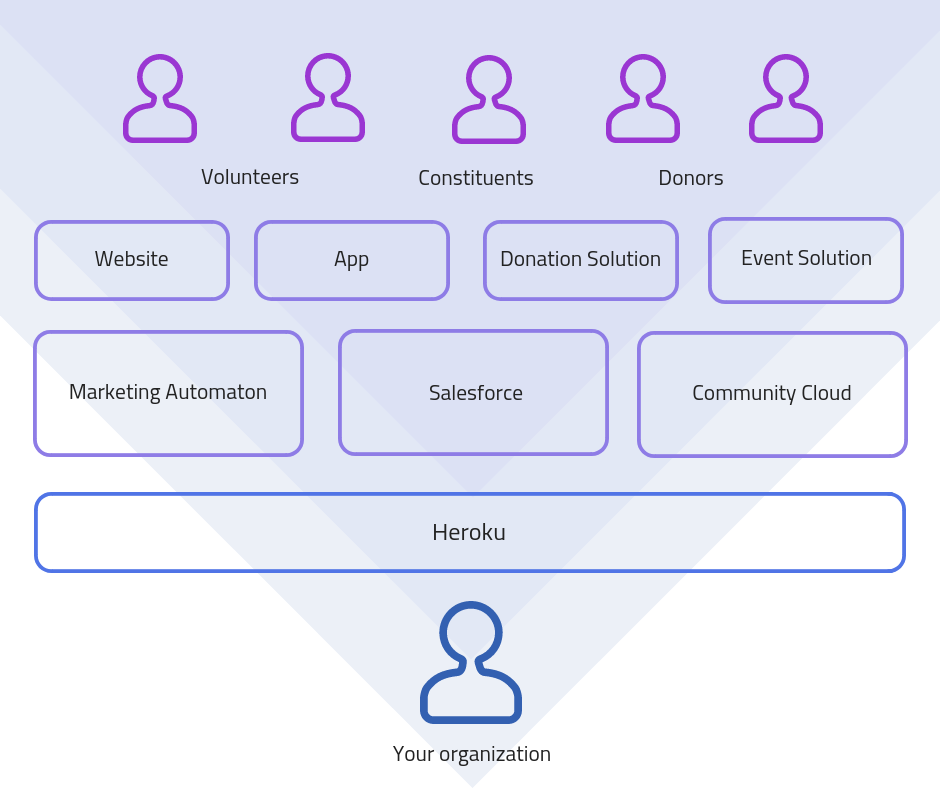3 use cases for Heroku and nonprofits
If you’ve been in the Salesforce world for awhile perhaps you’ve heard about Heroku in passing. Some of the coolest things featured in Dreamforce keynotes are built on Heroku. For example, the “Flavor Labs” app that was previewed in Salesforce CEO Marc Benioff’s keynote this year.
But what exactly is Heroku?
And how is Heroku relevant to nonprofit organizations?
Heroku Enterprise is an extremely versatile multi-code language platform that allows you to build, scale, and deploy modern applications. Heroku can also be used as a central source of truth to assist you in the management of your data and disparate systems. Heroku syncs bi-directionally in near real-time without you having to worry about running into any of the typical Salesforce API or event limitations.
Let’s use Legos as a metaphor: Heroku is essentially that base layer of your Lego world, the land so to speak. You connect all of your pieces to this one central point. This gives you a strong foundation for everything that you build. This allows you to connect your house, your office, your vehicles, the roadways, and more to this base layer.

Let’s look at three specific examples of how Heroku can be used to delve into this further.
Use case #1: Heroku can be your central data hub
Heroku can be used as a central data management point for various reasons. You can connect a multitude of various systems together using Heroku with Heroku Connect. It allows for bi-directional communication in near real-time. Through Heroku’s bi-directional communication between Salesforce and all of your disparate systems, you can create a “Single Source of Truth” for all of your data.
For example, let’s imagine an organization is currently using Salesforce’s Nonprofit Success Pack as their CRM, Marketing Cloud for their marketing automation, and Community Cloud for their volunteer portal. Then they are using QuickBooks Online for accounting, Talkdesk for their telephony system, Rallybound for their donation management, and various other systems.

You would utilize Heroku as the central point for all of the data truth for these systems. Using Heroku and Heroku Connect will allow you to enable bidirectional communication in near real-time.
Let’s look at another example. Say there is a nonprofit dedicated to providing meals to underprivileged people in a large metro area. To do this, they track volunteers, donors, food vendors, plus they manage program-specific data as well to report on individual impact. They use Salesforce primarily for this and thus have accumulated a lot of data over the years.
Heroku will allow this organization to have a 360-degree view of their internal activities. Using Heroku as the central point of truth for all of their systems and disparate data will allow them to manage the entire infrastructure with more visibility.
Some will ask “can’t you do this with Salesforce alone?” The answer is yes, but there are always limitations (including pesky data storage limitations). Heroku allows you to circumvent the Salesforce limitations and make sure your data is managed efficiently.
Use Case #2: Heroku can host your application
If you have ever built an application, you know that deciding where to host the application and considering how your data storage will be affected over time is a primary concern.
Heroku can help you here. It will provide a centralized platform for your website, application, and other disparate systems.
Moreover, Heroku allows you to create web and mobile applications that are “pixel perfect”, meaning you are able to create the highest quality look and fluid user experience regardless of the device that your customers are using to find you online.
A great example of a nonprofit doing amazing work through Heroku is charity:water, who has a dispatch monitor app that measures and analyzes water flow data from a sensor installed on the wells, with a component for field staff to manually record maintenance or observation data.
This app was originally built on PHP and Java, but had become outdated and difficult to maintain or scale. charity:water decided to rebuild their fundraising solution from scratch to include peer-to-peer fundraising functionality as well as this field-level data. They are currently in the process of rebuilding their full website on Heroku as well. charity:water’s engineers have used Heroku Post-gres, Heroku’s Git Integration, and a wide range of Heroku add-ons to support their vision.
Use Case #3: Heroku can be where you build out custom Salesforce Communities
For enterprise-level organizations with several hundred thousand members, building out a custom community on Heroku is better than building out a custom community on Community Cloud.
On Heroku, you are able to build out a custom community portal without worrying about incurring license fees for a massive amount of users. This allows you to have a fully scalable community, without the extraneous licensing costs.
Plus, Heroku will allow you to build something that looks a lot better than standard Communities, with the benefit of the same powerful functionality.
Inspired to check out Heroku for your nonprofit?
At Idealist Consulting we have long believed that nonprofits should have access to the best and most innovative technology, such as Heroku. If you are interested in talking about what this could look like for your organization, we’d love to chat.
















